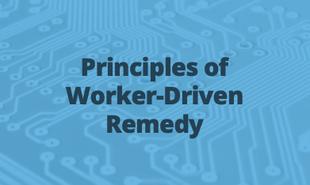New: Worker-Driven Remedy Principles
Electronics Watch publishes an updated version of its Principles of Worker-Driven Remedy, as a guiding framework for public buyers and other stakeholders to address harm to workers in supply chains. Developed in consultation with trade unions, labour rights organisations, and public buyers, the Principles put affected workers at the heart of the remediation process.
Everyone who suffers harm has a right to an effective remedy. However, workers in global supply chains who suffer business-related human and labour rights abuses often receive no remediation, even when there is evidence of harm. For example, there is often no medical care for workers suffering long-term health impacts from harmful chemicals, no financial compensation for wage theft, no social or psychological support for sexual abuse. Workers may not even get an apology for harm caused. In cases when some form of remedy is provided, it is usually companies that decide what remedy they will provide, and workers are not consulted.
We believe that remedy should be provided as a right, based on international human rights law and international labour standards and have workers at its core. The importance of rights-holder involvement in remedy is widely recognised.
These newly updated 10-point Principles define the Electronics Watch approach to worker-driven remedy, setting out the requirements of effective remedy processes and outcomes. Electronics Watch will provide support for public buyer affiliates to implement the principles in their supply chains.
To raise industry awareness of remedy and why it is needed, Electronics Watch also held an Introduction to Worker-Driven Remedy event following the RBA Annual Conference in October. Highlighting the new Principles, the two-hour session started with a film of worker testimony from Hungary, India, Indonesia, Malaysia, and Vietnam, calling for remedy.
Panellists discussed the basis for remedy in international human rights law, the demand for remedy in public procurement, and practical steps companies can take to provide remedy. They explored issues facing migrant workers and what remedy might look like for them, as well as for workers harmed by toxic chemicals used in the electronics industry. They also highlighted how the Swedish Regions are driving respect for workers' rights in global supply chains with a new contract clause requiring remedy, and how this practice could be expanded to more public buyers.


